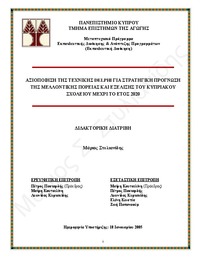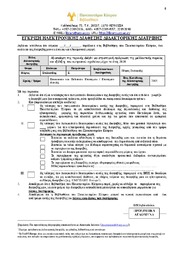| dc.contributor.advisor | Πασιαρδής, Πέτρος | el |
| dc.contributor.author | Στυλιανίδης, Μάριος Σ. | el |
| dc.coverage.spatial | Κύπρος | el |
| dc.coverage.spatial | Cyprus | en |
| dc.creator | Στυλιανίδης, Μάριος Σ. | el |
| dc.date.accessioned | 2015-03-05T09:31:33Z | |
| dc.date.accessioned | 2017-08-03T09:40:01Z | |
| dc.date.available | 2015-03-05T09:31:33Z | |
| dc.date.available | 2017-08-03T09:40:01Z | |
| dc.date.issued | 2005 | |
| dc.date.submitted | 2005 | |
| dc.identifier.uri | https://gnosis.library.ucy.ac.cy/handle/7/39235 | en |
| dc.description | Περιέχει βιβλιογραφικές παραπομπές. | el |
| dc.description | Διατριβή (Διδακτορική) -- Πανεπιστήμιο Κύπρου, Σχολή Κοινωνικών Επιστημών και Επιστημών Αγωγής, Τμήμα Επιστημών της Αγωγής, 2005. | el |
| dc.description | Η βιβλιοθήκη διαθέτει αντίτυπο της διατριβής σε έντυπη μορφή. | el |
| dc.description.abstract | Βασικός σκοπός της παρούσας έρευνας ήταν η στρατηγική πρόγνωση της μελλοντικής πορείας και εξέλιξης του κυπριακού σχολείου μέχρι το έτος 2020. Ως προγνωστικό εργαλείο αξιοποιήθηκε η τεχνική Delphi, ενώ μελετήθηκε ταυτόχρονα η αποτελεσματικότητά της στην επίτευξη συναινετικών προγνώσεων. Το όλο ερευνητικό εγχείρημα καθοδηγήθηκε από τα ακόλουθα πέντε ερευνητικά ερωτήματα:
1. Σε ποιο βαθμό η τεχνική Delphi συμβάλλει στην επίτευξη συναίνεσης;
2. Ποια μειονεκτήματα και ποια πλεονεκτήματα παρουσιάζει γενικά η εφαρμογή της τεχνικής Delphi;
3. Ποιες στρατηγικές είναι αναγκαίο να εφαρμοστούν σήμερα για προληπτική αντιμετώπιση του μέλλοντος του κυπριακού σχολείου;
4. Ποια προβλήματα είναι πιθανό να αντιμετωπίσει το κυπριακό σχολείο μέχρι το έτος 2020 και ποιος ο βαθμός δυσκολίας του κάθε ενός από αυτά;
5. Ποιες αλλαγές και εξελίξεις είναι πιθανό να επισυμβούν στο κυπριακό σχολείο μέχρι το έτος 2020 και πόσο επιθυμητή είναι η πραγματοποίησή τους;
Η συλλογή των δεδομένων για απάντηση των πιο πάνω ερωτημάτων έγινε μέσα από τρεις διαφορετικούς γύρους στους οποίους είχε εμπλακεί μια ομάδα 50 ειδικών στο χώρο της κυπριακής εκπαίδευσης. Η συλλογή των δεδομένων στον πρώτο γύρο έγινε με ατομικές συνεντεύξεις, ενώ στους δύο επόμενους γύρους έγινε με ερωτηματολόγια που συμπληρώθηκαν μέσω διαδικτύου, αξιοποιώντας λογισμικό πρόγραμμα που είχε αναπτυχθεί.
Η ανάλυση των απόψεων των συμμετεχόντων έδειξε ότι η τεχνική Delphi, παρά τις επιμέρους αδυναμίες που παρουσιάζει, συνιστά ένα αποτελεσματικό μεθοδολογικό εργαλείο για τη διερεύνηση της μελλοντικής πορείας και εξέλιξης του κυπριακού σχολείου. Μπορεί επίσης να συμβάλει, κάτω από συγκεκριμένες προϋποθέσεις, στην επίτευξη συναίνεσης μεταξύ των συμμετεχόντων.
Έναν από τα βασικά ευρήματα, αναφορικά με το μελλοντικό κυπριακό σχολείο, αφορά την ανάγκη για ανάπτυξη συγκεκριμένων στρατηγικών για προληπτική αντιμετώπιση των προκλήσεων του μέλλοντος. Ως οι πιο αναγκαίες τέτοιες στρατηγικές αναδείχθηκαν η ίδρυση φορέα για στρατηγικό σχεδιασμό της εκπαίδευσης, η επιστημονική ανάλυση και αξιολόγηση των αναγκών του συστήματος, η αναδιάρθρωση της διοικητικής δομής του αρμόδιου υπουργείου, η προτεραιότητα στην έρευνα, η συστηματική παρακολούθηση των διεθνών εξελίξεων, η ετοιμασία ολοκληρωμένου στρατηγικού σχεδίου ανάπτυξης και η συστηματική στρατηγική πρόγνωση του μέλλοντος.
Τα επικρατέστερα προβλήματα που αναμένεται να αντιμετωπίσει μελλοντικά το κυπριακό σχολείο εκτιμήθηκε ότι θα έχουν σχέση με την έξαρση της μαθητικής βίας και παραβατικότητας, τη σύγχυση για τον φιλοσοφικό προσανατολισμό της εκπαίδευσης, την εξάπλωση των εξαρτησιογόνων ουσιών στα σχολεία και τις δυσκολίες προσαρμογής του εκπαιδευτικού συστήματος στις νέες τεχνολογίες.
Από την περαιτέρω ανάλυση των δεδομένων προέκυψε ότι τα τέσσερα πιο πιθανά χαρακτηριστικά του μελλοντικού κυπριακού σχολείου θα έχουν σχέση με την εξάπλωση του φαινομένου της μαθητικής παραβατικότητας, την πορεία σύγκλισης με το ευρωπαϊκό σχολείο, την έμφαση στη συνεχή αξιολόγηση και την προσπάθεια σύγκλισης του σχολείου με την κοινωνία της πληροφορίας. Τα τέσσερα πιο επιθυμητά χαρακτηριστικά σχετίζονται με τη συνεχή επιμόρφωση του προσωπικού, την ανάδειξη του σχολείου σε οργανισμό που μαθαίνει, τη συνεχή αξιολόγηση του εκπαιδευτικού έργου και τον ανασχεδιασμό ωρολογίων και αναλυτικών προγραμμάτων.
Μέσα από την όλη διαδικασία πρόγνωσης που έχει ακολουθηθεί συγκεκριμενοποιήθηκε και αναπτύχθηκε ένα μοντέλο στρατηγικής πρόγνωσης, που έχει ως βασικούς άξονες τη στοχαστική πρόγνωση, την εκτίμηση του βαθμού επιθυμίας και του βαθμού πιθανότητας για κάθε πρόγνωση, την επισήμανση της απόκλισης που υπάρχει και τη συγκεκριμενοποίηση των αναγκών και των προτεραιοτήτων για προληπτική δράση. | el |
| dc.description.abstract | The purpose of this study was the strategic foresight of the future of the Cypriot school until 2020. Delphi technique was used as the basic forecasting tool, while simultaneously its effectiveness for the achievement of consensus forecasts was studied. Research was conducted by the following research questions:
1. At what degree does Delphi technique contribute to the achievement of consensus?
2. Which advantages and disadvantages does the application of Delphi technique present?
3. What are the essential strategies for anticipating the future of education in Cyprus?
4. Which problems are likely to be faced by the Cypriot school until 2020 and what is the difficulty degree for each one of them?
5. Which changes are likely to take place at Cypriot school until 2020 and how desirable is each one of them?
A three-round Delphi technique was used in order to make predictions about the future of schools and schooling in Cyprus, based on the opinions of a panel of 50 Cypriot experts. Data collection at the first round was achieved through personal interviews, while for the next two rounds was achieved through questionnaires that completed online.
Analysis of the participants’ views shows that Delphi technique, despite the deficiencies that presents, constitute an effective methodology tool for the investigation of the future process and improvement of Cypriot school. Under particular conditions, Delphi technique can contribute to the achievement of consensus between participants.
One of the basic findings of the research, regarding the future Cypriot school, concerns the need for the development of particular strategies for the preventive treatment of future challenges. The most necessary strategies that highlighted are the establishment of a mechanism for strategic planning of education, the scientific analysis and evaluation of the system’s needs, the restructuring of administrative structure of the ministry, the priority to research, the systematic monitoring of international developments, the preparation of a complete strategic plan for development and the systematic strategic foresight of the future.
It’s estimated that the predominant problems that are expected to be faced by the Cypriot school at future will linked with increase of pupils’ violence, the confusion about philosophic orientation of education, the spreading of addictive substances at schools and the adaptation difficulties of the educational system regarding new technologies.
From the further data analysis, is emerged that the four most possible characteristics of the future Cypriot school will be related with the expansion of school violence phenomenon, convergence with European school, emphasis on evaluation procedures and the compatibility of the school with the information society. The four most desirable characteristics are related with the emphasis on staff development programs, upgrading the school as a learning organization, the continuous evaluation of educational work and the redesigning of the school infrastructure and programs.
Through this process of forecasting that followed, a strategic forecast model was concreted and developed that has as basic elements the reflective prediction, estimation of desire and possibility degree for each prediction, the labeling of deviation that exists and the identification of needs and priorities for preventing action. | en |
| dc.format.extent | xx, 524 σ. ; 30 εκ. | el |
| dc.language.iso | gre | en |
| dc.publisher | Πανεπιστήμιο Κύπρου, Σχολή Κοινωνικών Επιστημών και Επιστημών Αγωγής / University of Cyprus, Faculty of Social Sciences and Education | |
| dc.rights | info:eu-repo/semantics/openAccess | en |
| dc.rights | Open Access | en |
| dc.subject.lcsh | Delphi method | en |
| dc.subject.lcsh | Education forecasting Cyprus | en |
| dc.subject.lcsh | Education and state Cyprus | en |
| dc.subject.lcsh | Educational planning Cyprus | en |
| dc.subject.lcsh | Educational change Cyprus | en |
| dc.subject.lcsh | Educational evaluation Cyprus | en |
| dc.subject.lcsh | Public schools Cyprus | en |
| dc.title | Αξιοποίηση της τεχνικής Delphi για στρατηγική πρόγνωση της μελλοντικής πορείας και εξέλιξης του κυπριακού σχολείου μέχρι το έτος 2020 | el |
| dc.title.alternative | An application of the Delphi technique of forecasting the future of school in Cyprus until 2020 | en |
| dc.type | info:eu-repo/semantics/doctoralThesis | en |
| dc.contributor.committeemember | Πασιαρδής, Πέτρος | el |
| dc.contributor.committeemember | Κουτσελίνη, Μαίρη | el |
| dc.contributor.committeemember | Κυριακίδης, Λεωνίδας | el |
| dc.contributor.committeemember | Σταύρου-Κωστέα, Ελενη | el |
| dc.contributor.committeemember | Παπαναούμ, Ζωή | el |
| dc.contributor.committeemember | Pashiardis, Petros | en |
| dc.contributor.committeemember | Koutselini, Mary | en |
| dc.contributor.committeemember | Kyriakides, Leonidas | en |
| dc.contributor.committeemember | Stavrou-Costea, Eleni | en |
| dc.contributor.committeemember | Papanaoum. Zoe | en |
| dc.contributor.department | Πανεπιστήμιο Κύπρου, Σχολή Κοινωνικών Επιστημών και Επιστημών Αγωγής, Τμήμα Επιστημών της Αγωγής | el |
| dc.contributor.department | University of Cyprus, Faculty of Social Sciences and Education, Department of Education | en |
| dc.subject.uncontrolledterm | ΣΤΡΑΤΗΓΙΚΗ ΠΡΟΓΝΩΣΗ | el |
| dc.subject.uncontrolledterm | ΚΥΠΡΙΑΚΟ ΣΧΟΛΕΙΟ | el |
| dc.subject.uncontrolledterm | ΤΕΧΝΙΚΗ DELPHI | el |
| dc.subject.uncontrolledterm | ΜΕΛΛΟΝΤΙΚΟ ΣΧΟΛΕΙΟ | el |
| dc.subject.uncontrolledterm | STRATEGIC FORESIGHT | en |
| dc.subject.uncontrolledterm | CYPRUS SCHOOL | en |
| dc.subject.uncontrolledterm | DELPHI TECHNIQUE | en |
| dc.subject.uncontrolledterm | FUTURE SCHOOL | en |
| dc.identifier.lc | LB41.5.S79 2005 | en |
| dc.author.faculty | Σχολή Κοινωνικών Επιστημών και Επιστημών Αγωγής / Faculty of Social Sciences and Education | |
| dc.author.department | Τμήμα Επιστημών της Αγωγής / Department of Education | |
| dc.type.uhtype | Doctoral Thesis | en |
| dc.rights.embargodate | 2005 | |
| dc.contributor.orcid | Πασιαρδής, Πέτρος [0000-0003-4263-8304] | |


